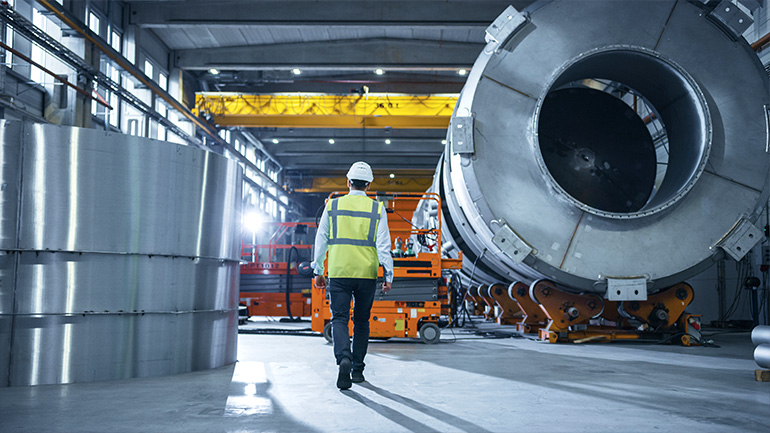Q&A with Bob Dorrance about the energy sector and environmental sustainability

The TDNewsroom sat down with Bob Dorrance, Group Head, Wholesale Banking, TD Bank Group and Chairman, Chief Executive Officer and President, TD Securities, to discuss his views on Canada's energy sector, environmental sustainability, and economic growth — July 2019
It's clear the energy sector remains an important economic engine for Canada; what's TD's participation in that sector?
BD: Canada's abundant energy supply means that the sector remains a key contributor of jobs and economic prosperity for many communities, with more than 900,000 jobs supporting the sector, which in turn generates billions of dollars in economic output. These industries, as well as the people and communities that rely on them, are critically important to Canada's economy.
Even as renewables become cheaper and more viable, global demand for conventional energy sources is expected to continue for such basic needs as transportation, heating and cooling, and power to support our manufacturing and services sectors. Therefore, we remain staunch supporters of our clients in the sector – as a leading lender, financial advisor, and capital markets provider – and believe in their potential for continued growth through responsible development.
At the same time, through our resources and expertise, we work cooperatively with our clients so that sound environmental policies and practices are applied. By actively engaging with our clients in the energy sector, we have a unique opportunity to work with them to navigate the complex and fast evolving environmental, social and governance landscape.
On balance, we are optimistic about the opportunities to support the expansion of innovative solutions geared towards improving efficiency and lowering emissions in fossil fuel-based energy production.
Where does TD stand on the issue of constructing energy pipelines in Canada?

We believe that economic growth and environmental sustainability are intrinsically linked, and that we have a responsibility to play a positive role in fostering both in Canada.
BD: Canada is fortunate to have a wealth of natural resources – getting those resources to market is crucial to our continued economic prosperity. In Alberta, there are hundreds of projects underway aimed at finding more sustainable ways to develop them.
Canada and the U.S. are considered to have some of the most stringent environmental and social regulatory standards among the major oil producing countries. A critical component to Canada's economic success will be a system that supports responsibleenergy projects today and into the future, as we all work towards a lower-carbon economy.
In our view, a clear and effective regulatory process for the approval of responsible energy infrastructure projects will encourage new domestic and international investment in Canada. This will contribute to economic growth and job creation, while promoting further innovation in sustainability.
TD is a major player in Green Bonds, has a publicly stated target to advance the low-carbon economy, continues to actively operate in Alberta and is committed to the development of responsible energy. What is the nature of that commitment and how do you navigate through these seemingly competing priorities?
BD: Good question. We don't see these priorities as competing but rather as complementing each other.
We believe that economic growth and environmental sustainability are intrinsically linked, and that we have a responsibility to play a positive role in fostering both in Canada. The opportunity lies in finding more ways to work with all energy players. We have the chance to develop innovative solutions to make existing fossil fuel-based production more sustainable as well as to encourage the responsible use of all our energy resources.
Our commitment to a low-carbon future is clear and expanding, with industry-leading investments and initiatives. However, we believe the transition to cleaner energy will take place over time as the mix of conventional and renewable sources gradually changes. It's imperative, for TD and for Canada, that we focus on both. That's both sound business and sound planning. Fundamentally, we believe that this is the right approach.
Can you talk a bit about TD's commitment to the low-carbon economy?
BD: In 2017, we launched a set of environmental initiatives to support the transition to a low-carbon economy, including a target of C$100 billion in low-carbon lending, financing, asset management and other programs by 2030. Our support for the transition to the low-carbon economy includes support for the energy sector in moving towards lower emissions and efficient operations. We are already 30% of the way to our target, and we estimate this has supported more than 76,000 jobs, contributed over C$15 billion to GDP and avoided more than 780,000 tonnes of greenhouse gas emissions – demonstrating that this transition can be good for the environment and the economy.
We were also the first major North American bank to become carbon-neutral in 2010, the first Canadian bank to issue a Green Bond in 2014, and in 2017, we became the only financial institution globally to participate in all three of the United Nations Environment Programme Finance Initiative Task Force on Climate-related Financial Disclosures pilots on lending, investment and insurance.
TD will continue to be a strong environmental leader and believes that responsible development of our natural resources must balance environmental, social and economic considerations.
This article was originally published on TD Newsroom.

